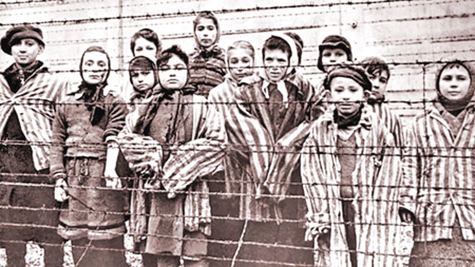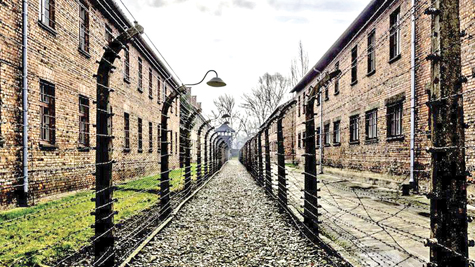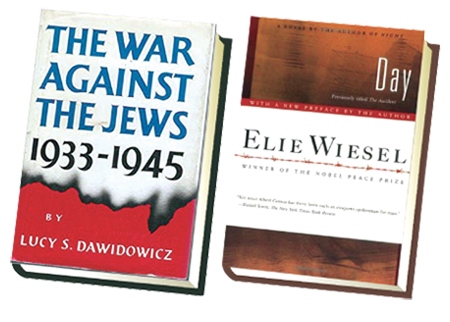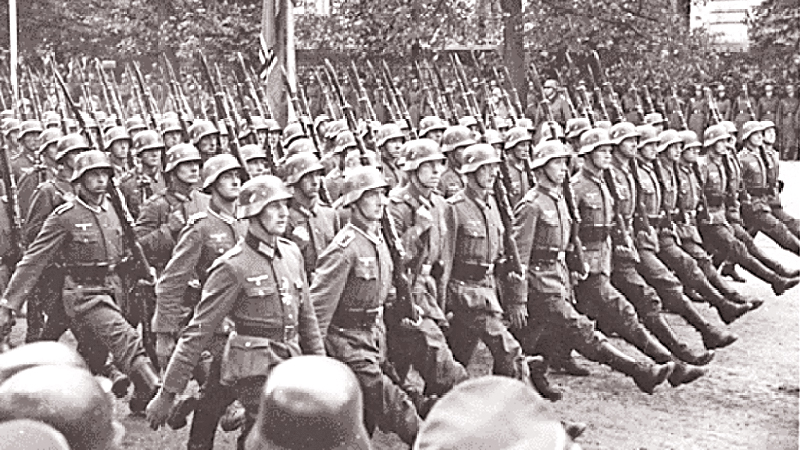These structures bear the mark of history. It is the unforgettable unexampled legacy. They bear witness to the atrocities of one man, whose name has become synonymous with evil. A man who took the earth for a colossus. He cast a shadow of fear and hatred over all who crossed his path.
 His name was Adolf Hitler – the man who should have been consigned to the dustbin of history, but whose legacy still haunts us.
His name was Adolf Hitler – the man who should have been consigned to the dustbin of history, but whose legacy still haunts us.
What once was a place of unspeakable terror now stands as a shrine to the darkest chapter in human history. The Auschwitz concentration camp, a complex of 48 sites built and operated by Nazi Germany during World War II, stands alone to recall the atrocities committed against countless innocent lives. Its walls hold the memories of three buildings: the original concentration camp, the extermination centre, and the labour camp.
Could there be a more haunting period in the annals of time than the lead up to World War II? The world may never wish to remember it, but the echoes of that terrible time continue to reverberate in literature. The words Auschwitz and Holocaust have become synonymous with the atrocities committed during that era, and no author who has written of that time can escape the shadow of their haunting presence.
In his work Day, Romanian-born American Jewish writer Elie Wiesel wrote: “A novel about Auschwitz is not a novel—or else it is not about Auschwitz.” This speaks to the enormity of the atrocities committed at Auschwitz and the lasting impact they have had on our world. International Holocaust Remembrance Day is an international memorial day on January 27 commemorating the tragedy of the Holocaust that occurred during the Second World War.
 It commemorates the genocide that resulted in the death of an estimated six million Jewish people, five million Slavs, three million ethnic Poles, 200,000 Romani people, 250,000 mentally and physically disabled people, and 9,000 men by the Nazi regime and its collaborators. It was designated by the United Nations General Assembly resolution 60/7 on November 1, 2005, during the 42nd plenary session. The resolution came after a special session was held earlier that year during which the United Nations General Assembly marked the 60th anniversary of the liberation of the Nazi concentration camps and the end of the Holocaust.
It commemorates the genocide that resulted in the death of an estimated six million Jewish people, five million Slavs, three million ethnic Poles, 200,000 Romani people, 250,000 mentally and physically disabled people, and 9,000 men by the Nazi regime and its collaborators. It was designated by the United Nations General Assembly resolution 60/7 on November 1, 2005, during the 42nd plenary session. The resolution came after a special session was held earlier that year during which the United Nations General Assembly marked the 60th anniversary of the liberation of the Nazi concentration camps and the end of the Holocaust.
In her The War Against the Jews: 1933–1945, Lucy Schildkret Dawidowicz elaborates how the Holocaust came to be. The term holocaust comes from the Greek term holókaustos: hólos, ‘whole’ and kaustós, ‘burnt offering’.
The task of documenting the full extent of the atrocities committed during the Holocaust through film and literature is an almost impossible one. While one may be able to watch all the films, the books would take a lifetime to read. Yet, even today, the Holocaust continues to inspire new works, with survivors often serving as the authors.
The question of verisimilitude, the quality of appearing true or real, is one that haunts Holocaust literature. In Image and Remembrance: Representation and the Holocaust, Sheryl Silver Ochayon grapples with this dilemma, asking, “Can this horrible experience be transformed into an aesthetic experience? Will readers who seek escape in books be ready to confront the terrible realities within?”
 Elie Wiesel, a leading critic of Holocaust literature, raises similar questions. “Auschwitz defeated culture, and then it defeated art,” he wrote. “The truth of Auschwitz remains hidden in its ashes.”
Elie Wiesel, a leading critic of Holocaust literature, raises similar questions. “Auschwitz defeated culture, and then it defeated art,” he wrote. “The truth of Auschwitz remains hidden in its ashes.”
Silenced voices
Theodor Adorno spoke of the difficulty of finding the right words to describe the horrors of Auschwitz, referring to poetry written in its aftermath as barbaric. He criticised the attempts of artists to capture the event that shook the world to its core. Many survivors of the Nazi concentration camps have noted the inadequacy of words in describing their experiences. They use expressions like ‘indescribable’, ‘inexpressible’, and ‘words are not enough’ to convey the terror they lived through.
Despite the difficulties, creativity remains the only cathartic means of expressing even the most traumatic experiences. When it comes to the Holocaust, a new language has been born. Holocaust literature encompasses various genres, with a significant portion written by victims and survivors, including posthumously published works and texts translated into English. There are also fake survivor accounts and works written by others based on the experiences of victims and survivors.
Echoes of survival
Amid the devastating destruction wrought by the Holocaust, a glimmer of hope shines through the personal accounts of survivors. Their words serve as a beacon of resilience, capturing their unbreakable spirit and unwavering determination to live, to endure, and to uphold the remnants of their humanity amidst the inhumanity. These tales take the form of diaries, stories, and poems, offering readers a glimpse into the lives of individuals with recognisable desires, passions, and sorrows.
The narratives humanise the countless victims of the Holocaust, bringing to life historical events with a vividness that transcends mere statistics. They offer a rich storehouse of facts and experiences, weaving a tapestry of courage and defiance against the tyranny of Nazi rule. The bravery displayed by Jews and non-Jews alike, in resisting the Nazi regime, is a testament to the power of the human spirit. From acts of overt rebellion to quiet demonstrations of resistance, these stories provide evidence of the victims’ refusal to submit to Nazi domination. They have now become a repository of remarkable tales, a legacy of courage and defiance in the face of overwhelming oppression.
Remembering, honouring, and learning
 The solemn commemoration of Holocaust Memorial Day serves as a gentle reminder of the atrocities of the past. The world remembers the lives that were lost, the lives that were shattered, the lives that will never be the same. It is a day to pay homage to the survivors, to the brave souls who, against all odds, persevered and found the courage to carry on. Their stories of survival, their tales of courage and hope, must not be lost to time.
The solemn commemoration of Holocaust Memorial Day serves as a gentle reminder of the atrocities of the past. The world remembers the lives that were lost, the lives that were shattered, the lives that will never be the same. It is a day to pay homage to the survivors, to the brave souls who, against all odds, persevered and found the courage to carry on. Their stories of survival, their tales of courage and hope, must not be lost to time.
In literature, Holocaust lives on, its legacy indelible, its memory eternal. Its presence in our modern-day books, films, and narratives serves as a constant reminder of the atrocities that occurred and the lessons that must be learned. The world must never forget the horrors of Holocaust and must strive to ensure that such evil is never allowed to happen again.
So on this day, let us pause and remember, let us honour and pay homage to the victims and survivors of Holocaust, and let us vow to never forget the lessons of the past.
Must-Read Books
The following books offer a comprehensive look at the Holocaust, encompassing a range of perspectives and experiences. From survivor accounts to historical examinations, these books serve as a starting point for understanding and remembering this tragedy. Each one provides a unique insight into the complexities of the Holocaust, making them essential reading for anyone seeking a deeper understanding of this dark chapter in history.
The Hunger Angel by Herta Muller
The story is centred on a young man called Leo Auberg, who at just 17 years of age is deported to a Soviet forced labour concentration camp in the Ukraine. He spends 5 years of his life there and the experience changes him forever. By 1945 world war two had ended, and yet for Leo, as a Romanian German in a territory now occupied by the Soviet Union, the war continues well after this date. Leo is persecuted under the Stalinist regime as a Romanian German, but what is also very true and moving about the novel is that we see Leo struggling on many battlefronts, personal as well as political.
As a young man trying to make sense of who he is as a homosexual man, Leo feels that his home is never really his home, and in a complex layering of feeling, deportation is felt partly as imprisonment, but also partly as a kind of liberation from the restrictions of family.
Among the Righteous by Robert Satloff
Thousands of people have been honored for saving Jews during the Holocaust — but not a single Arab. Looking for a hopeful response to the plague of Holocaust denial sweeping across the Arab and Muslim worlds, Robert Satloff sets off on a quest to find the Arab hero whose story will change the way Arabs view Jews, themselves, and their own history.
The story of the Holocaust’s long reach into the Arab world is difficult to uncover, covered up by desert sands and desert politics. We follow Satloff over four years, through eleven countries, from the barren wasteland of the Sahara, where thousands of Jews were imprisoned in labor camps; through the archways of the Mosque in Paris, which may once have hidden 1700 Jews; to the living rooms of octogenarians in London, Paris and Tunis.
The story is very cinematic; the characters are rich and handsome, brave and cowardly; there are heroes and villains. The most surprising story of all is why, more than sixty years after the end of the war, so few people — Arab and Jew — want this story told.
After Such Knowledge by Eva Hoffman
As the Holocaust recedes in time, the guardianship of its legacy is being passed on from its survivors and witnesses to the next generation. How should they, in turn, convey its knowledge to others? What are the effects of a traumatic past on its inheritors? And what are the second-generation’s responsibilities to its received memories?
In this meditation on the long aftermath of atrocity, Eva Hoffman — a child of Polish Jews who survived the Holocaust with the help of neighbours, but whose entire families perished — probes these questions through personal reflections, and through broader explorations of the historical, psychological, and moral implications of the second-generation experience.
She examines the subterranean processes through which private memories of suffering are transmitted, and the more willful stratagems of collective memory. She traces the “second generation’s” trajectory from childhood intimations of horror, through its struggles between allegiance and autonomy, and its complex transactions with children of perpetrators.
As she guides us through the poignant juncture at which living memory must be relinquished, she asks what insights can be carried from the past to the newly problematic present, and urges us to transform potent family stories into a fully informed understanding of a forbidding history.







